Are robots taking over the world? That’s been a popular sci-fi trope for decades, but in recent years, it’s become an increasingly relevant topic. With advancements in artificial intelligence and automation, it’s becoming more and more likely that robots will play a larger role in the workforce than ever before. This has led to fears of a “job apocalypse,” where human workers are replaced by robots. But is this really the case? Let’s take a closer look.
Robo-takeover: Rise of the Machines
It’s no secret that robots are becoming more advanced every day. From manufacturing to healthcare to customer service, robots are taking over a variety of tasks that were once done exclusively by humans. This is due in large part to the rapid advancements in artificial intelligence and automation technology, which has made it possible for robots to perform complex tasks with a high degree of accuracy and efficiency.
While this may sound like a cause for concern, it’s important to remember that robots aren’t going to replace every human job overnight. Certain industries and tasks will be more susceptible to automation than others, and there will always be a need for human ingenuity and creativity. In fact, some experts predict that the rise of robots will actually create more jobs than it eliminates, as new industries and roles emerge to support the development and maintenance of robots.
Job Apocalypse? Not So Fast.
Despite the potential benefits of robots in the workforce, there are still concerns that automation will lead to widespread job loss. Some estimates predict that up to 800 million jobs could be lost worldwide by 2030 due to automation. However, it’s important to remember that not all jobs are created equal, and some are more likely to be replaced by robots than others.
Jobs that involve repetitive or manual tasks, such as assembly line work or data entry, are more likely to be automated than those that require creativity or critical thinking. Additionally, some jobs will always require a human touch, such as healthcare or education. While there will undoubtedly be a period of adjustment as the workforce adapts to the rise of robots, it’s unlikely that automation will lead to a complete job apocalypse.
Fear Not: Embracing Our Robot Colleagues 🤖❤️
So, what does the rise of robots mean for the future of work? While there will undoubtedly be some challenges, there are also opportunities for humans to work alongside robots in new and innovative ways. By embracing our robot colleagues, we can create a more efficient and productive workforce that benefits everyone.
For example, robots can be used to perform dangerous or physically demanding tasks, freeing up humans to focus on more creative or high-level work. Additionally, robots can work around the clock without tiring, allowing businesses to operate more efficiently and provide better service to customers. By working together, humans and robots can create a future of work that is both productive and fulfilling.
In conclusion, while the rise of robots in the workforce may seem like a cause for concern, it’s important to remember that automation will not lead to a job apocalypse overnight. By adapting to the changing landscape of work and embracing our robot colleagues, we can create a more efficient and productive future for everyone. So let’s welcome our new robot overlords with open arms – after all, they’re here to help. 🤖❤️
